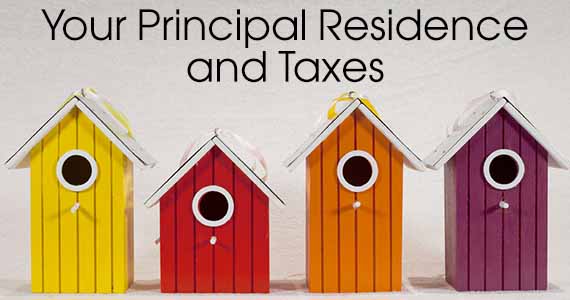On October 3, 2016, the Government announced multiple changes to mortgage qualification. One of these changes was a change to the Canada Revenue Agency’s reporting requirements for the sale of a principal residence. At the time, it was portrayed as closing a loophole to target foreign real estate investors. This change will impact every home sale in Canada whether you are Canadian resident or a foreign investor.
The tax rules around principal residences are so complex that many Canadians simply don’t recognize when they might owe tax when they sell a property. Many have assumed that every sale of a residence is always tax-free thanks to the principal-residence exemption (PRE). Until the announced change effecting the 2016 tax year, the CRA did not require Canadians to report the sale of a principal residence, if the PRE will shelter the full gain from tax. This resulted in many home sales going unreported, and no taxes being paid, even in situations where tax should have been owing.
When you sell a home, you may realize a capital gain. If the property was your principal residence for every year you owned it, you do not have to pay tax on the gain. If it was not your principle residence you do.
Possible examples of when you could include be subject to capital gains are: second homes, vacation properties or cottages, rental properties, “quick flips” or short holding periods, a house that was not lived-in in each year of ownership, or serial builders who build, then occupy, a house before selling (these would be considered inventory and not a principle residence).
So, how does a property qualify as a principle residence?
A family can only designate one house as their principle residence and it must meet all the following four conditions:
- It is a housing unit, a leasehold interest in a housing unit, or a share of the capital stock of a co-operative housing corporation you acquire only to get the right to inhabit a housing unit owned by that corporation
- You own the property alone or jointly with another person
- You, your current or former spouse or common-law partner, or any of your children lived in it at some time during the year you are designating it as your principle residence
- You designate the property as your principal residence
For families with more than one property, or a real estate type business (i.e. flippers and builders) it’s wise to talk to a tax specialist that can help you calculate potential taxes owing. They can advise you as to when and how you should designate each property as your principal residence to maximize the exemption and minimize the amount of tax owed on each property.
For more information, check out the CRA Site.
Co-written with the team from Your Mortgage Advantage – Susan Ashton, Martin Breeze, Brooke Juba, Garett Courtier and Jeff McGinn



Leave A Comment